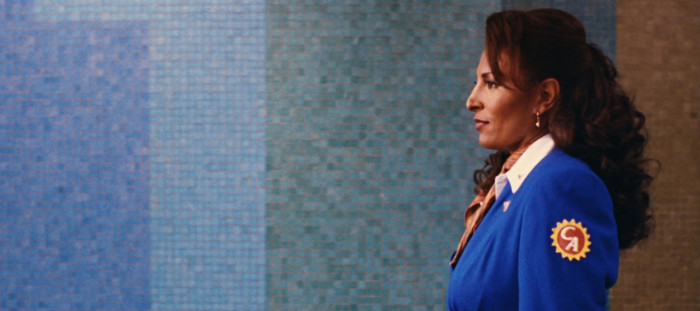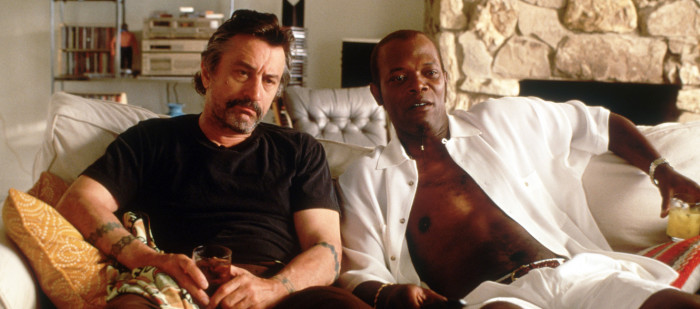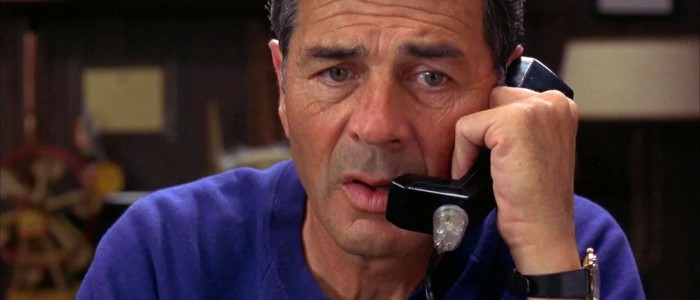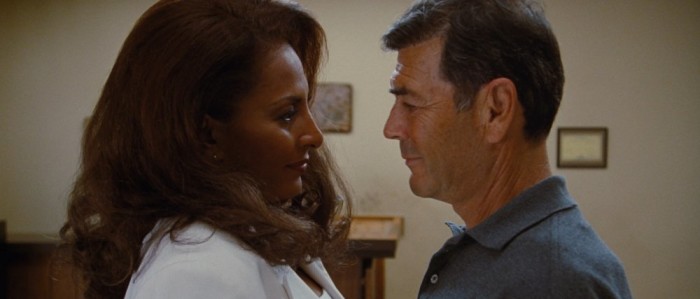'Jackie Brown' At 20: Revisiting Quentin Tarantino's Best And Most Underrated Movie
Pulp Fiction ('94) changed the face of cinema forever. Though that's become something of a clichéd declaration amongst cinephiles, the statement nonetheless contains an immeasurable volume of truth. While Quentin Tarantino's first completed feature, Reservoir Dogs ('92), underperformed in the United States – its foulmouthed, hyper-violent tendencies contributing to a notorious reputation and cult following on VHS – the Sundance darling was a gigantic hit in Europe, with London and Paris theatrical engagements running for months at a time. When Pulp Fiction landed at the Cannes Film Festival, it did so with the impact of an atomic bomb, blowing critics' minds and making a rock star out of its video store clerk turned geek chic co-writer/director.Pulp Fiction was produced for a cool $8 million, going on to gross over $200 million worldwide. It caused a ruckus at Cannes, winning the festival's highest honor while one onlooker screamed "scandal!" from the back row, flipping its director the bird. Miramax Films was instantly dubbed "the house that Tarantino built," as the indie label now had the clout (not to mention the capital) to start chasing Oscar contenders it became notorious for representing throughout the rest of its Weinstein-headed existence. A wave of imitators flooded in – just look at something like 2 Days In the Valley ('96) for the most shameless example – and everyone wondered what Tarantino would do to follow up his self-aware filmic pop amalgamation.
The answer wasn't as simple as everyone thought when Jackie Brown ('97) premiered on Christmas Day three years later.
Just as he'd drawn from the art and exploitation films he began watching at eight years of age – when (legend has it) his parents took him to see Mike Nichols' Carnal Knowledge ('71), then a double bill of Deliverance ('72) and The Wild Bunch ('69) the next year – to write his own Pulp Fiction by hand, he looked to the collaborations of Jack Hill and Pam Grier (whom he'd recruit to star as the titular aging flight attendant) as inspiration. Blaxploitation pictures like Foxy Brown ('74) were fused with Akira Kurosawa's Rashomon ('50); a synthesis of high and low-brow that he grafted onto the laid-back prose of crime author Elmore Leonard, whose Rum Punch became the source for what still stands as QT's most human, emotionally affecting work.
Rum Punch
Originally published in '92, Elmore Leonard's Rum Punch is another of his Florida hang out noirs. Set in Miami, Florida, the novel follows a 44-year-old black stewardess, working on a puddle jumper airline, flying into and out of Jamaica. The job acts as a cover to smuggle money for gunrunner Ordell Robbie; yet on her latest trip, Jackie gets busted by local cops, working a sting on Robbie with the aid of ATF Agent Ray Nicolette. After getting bailed out by Ordell, she tries to dig herself out of the hole by participating in a score to get the rest of the crook's money back into the U.S. Only Jackie conspires with bail bondsman Max Cherry to try and swindle Robbie out of the money, so she can stop living this bottom rung life she's been stuck in for seemingly forever.
The only adaptation on Tarantino's resume to date, Jackie Brown was the middle movie in a '90s Leonard revival that saw his baked pulp transmuted into cinematic Maui Wowie. Two years earlier, John Travolta parlayed the "comeback" role Tarantino had gifted him in Pulp Fiction – dancing hitman Vincent Vega – into another silly lug in Barry Sonnenfeld's big screen iteration of Get Shorty ('95). The year after Jackie Brown, Steven Soderbergh recruited George Clooney and Jennifer Lopez into his own cool comedy, Out of Sight ('98), which also featured Michael Keaton reprising his QT role of Ray Nicolette (while screenwriter Scott Frank penned both Shorty and Sight). It was a high-water mark in terms of the medium showing Leonard's words the respect they deserve, as the only reworkings of his novels that could even be included in the qualitative conversation with these three up to this point were Abel Ferrara's Cat Chaser ('89) and John Frankenheimer's 52 Pick-Up ('86).
The bulk of Rum Punch remains intact on screen, only Tarantino transplants all the action from Leonard's Miami beaches to Compton and the San Fernando Valley stomping grounds of Pulp Fiction (not to mention Ordell's banks from Jamaica to Mexico). With the aid of cinematographer Guillermo Navarro – who shot From Dusk Till Dawn ('96) for QT's filmic brother, Robert Rodriguez (which also featured Tarantino in a prominent role) – and trusty editor Sally Menke (who cut all of his films up until her death in '09), Leonard's text was easily transported into Quentin's universe. For all the audience knew, Jackie could've been pulling the heist of her life right down the street from Marcellus Wallace's joint, where Red Apple cigarettes are sold behind the bar.
Yet it's Tarantino's usual fast-talking attitude – not to mention his personally curated collection of obscure soul hits from the '70s – that truly sells us on Jackie Brown being another one of his singular works. From the moment the title streaks across the screen, with Jackie magically floating through the airport as Bobby Womack wails the theme song to Blax staple Across 110th Street ('72), we know we're safely in the master's hands, all while he subtly conveys the themes of the movie without anyone spitting a line of his trademark dialogue. Here's a working girl who goes from walking to running, just to make her plane. Because if she misses it, that's one paycheck she can't cash, and another day lost in this unfair rat race. When relief hits Jackie's face as she reaches the gate, we're just as happy as she is, because Tarantino and Grier have already told us so much about this strong, struggling black woman, and there's still one hundred and fifty blissful minutes to go.
Ordell Robbie and the Miracle of Samuel L. Jackson
Samuel L. Jackson and Quentin Tarantino are one of the more underrated actor/director pairings in the history of cinema. Starting with his Oscar nominated turn as Jheri -curled, scripture quoting man of violence Jules Winnfield in Pulp Fiction, Jackson found a consummate collaborator in QT that he'd been lacking up to this point in his already lengthy career. For certain, the '90s had already been kind to Jackson – appearing in Jurassic Park ('93), Die Hard With A Vengeance ('95), and The Long Kiss Goodnight ('96) – but nobody had really tapped into Jackson's movie star potential quite like Tarantino. Until Jules, he'd mostly been an "everyman" character actor, able to play Jack Ryan's best buddy in Patriot Games ('92), and an alcoholic, speed-chess champion father in Fresh ('94) with equal ease.
However, as iconic as Jackson was, screaming about "great vengeance and furious anger" before blowing Brett's head off in Pulp Fiction, Ordell Robbie may be the more complicated of the two roles to pull off. Sporting an array of Kangol caps, a ponytail, and radiating smoldering menace while still being obnoxiously charming (often in the same scene), Tarantino's script calls for us to hang out with Robbie for a good deal of the picture, even though we're scared of him. As he watches girls in bikinis shoot AK-47s with his right-hand homie Louis (Robert De Niro – in what may be the last great performance of his career), and stoner surfer gal mistress, Melanie (Bridget Fonda), Jackson makes damn sure we don't miss a moment of the character's charisma, commenting in his first scene about how a Tech Nine actually advertises that it's "the most popular gun in American crime." (Can you believe that shit?)
Fascinating is the fact that, before Jackson started landing higher profile roles in big budget genre pictures, he mostly worked in Spike Lee movies (including Lee's landmarks Do the Right Thing ['89] and Jungle Fever ['91]). Lee was hyper-critical of Tarantino leading up to the release of Jackie Brown, railing against the iconoclastic writer/director's use racial slurs in his numerous screenplays. Pointing out that the epithet is used thirty-eight times in Jackie Brown, Lee told Variety in '97, "I'm not against the word, and I use it, but not excessively. And some people speak that way. But, Quentin is infatuated with that word. What does he want to be made – an honorary black man?"
Lee's usual rabble rousing struck a chord with Jackson, who stuck up for Tarantino in the press. "Black artists think they are the only ones allowed to use the word," Jackson told Jet Magazine at the time. "Well, that's bull. This film is a wonderful homage to Black exploitation films (of the '70s). This is a good film. And Spike hasn't made one of those in a few years." Jackson stopped working with Lee due to the beef, until the two reunited on the director's '13 remake of the Korean thriller, Oldboy ('03). Not that it matters, but one can't help but wonder if the topic of Django Unchained ('12) – Tarantino's Black Western – ever came up between the two, let alone the fact that Tarantino has since publicly labeled Lee a "racist." Probably not, as Jackson – being a steadfast professional – is perhaps happy to simply lend his exceptional persona and talents to two of America's greatest filmmakers.
Seven Million Miles
At its core, Jackie Brown isn't about heists, or criminals, or getting stoned. Those elements are all just window dressing for what Tarantino is truly interested in: how Jackie and Max Cherry (Robert Forster, in a role that'd rightfully earn him a Best Supporting Actor nod at the Oscars) approach getting old. For Max, there isn't much to stress about. Sure, he'd worried about losing his hair at one point, but once it began to fall out, he "did something about it", and now feels good about himself again. When Cherry looks in the mirror, it's still the same guy who's written fifteen thousand bail bonds (and that's plenty).
But Jackie's had a bit of a rougher road than Max. A former offender who was put on probation after getting caught carrying drugs for her ex-husband, she's started over more times than she can count. Now, she's forty-four, flying the shittiest little airline who will still hire her, and if she loses this job, Jackie has no idea what the hell she'd do with herself. She can't start over again. It's too late for anything like that. The cash she's going to swipe from Ordell seems like the easiest answer to her problems; a score that'd finally allow her to take a load off and retire in the sun she's slaved so hard over the years to comfortably deliver other folks to.
There's a tenderness to the way Tarantino approaches Jackie and Max's relationship that's certainly reared its head in his other work – the final conversations between Bill (David Carradine) and Beatrix Kiddo (Uma Thurman) during the ultimate chapter of Kill Bill ('03) come to mind – but never in such a crystalized fashion. His camera loves both characters, and when they share the frame together, we're merely a fly on the wall, quietly observing a growing tension that's obviously been absent for several years in both of their lives. As Jackie first emerges from the darkness when Max comes to bail her out of jail on Ordell's bond, she's like an angel he didn't know could still exist, approaching like a Jacques Tourneur femme fatale. Ditto his acts of absolute kindness and concern for Jackie, who doesn't seem like she's had a man genuinely listen to her gripes about aging with such compassion in a long, long time.
When the two collaborate on the heist, there's a shorthand that develops between them that the actors convey with brief glimpses and slight body language (which are emphasized by Tarantino's fractured, omni-perspective narrative approach). They're intimate partners without ever touching one another's bodies; sharing a wavelength only they're operating on together. Maybe this is because, like starting over, at their age there aren't many chances for true love like there were in their 20s and 30s – when Grier sported that afro in Coffy ('73) and Forster that tight black tee in Medium Cool ('69). It's the heartbreaking truth of having more sunsets behind you than there are in front of you: the opportunities to love, be loved, and share love lessen by the day, and you must grab ahold of them when they present themselves, because you never know if that spark you feel will be the last of your life once it fades away.
Across 110th Street
In the end, Jackie Brown is a nothing less than a love letter to Grier, who delivers the turn of her life – going from harried working girl, to purring sex kitten, to gun-toting badass, sometimes all in the same scene. Nevertheless, we never lose sight of the fact that Jackie feels over the hill, and the bags under her eyes can't be rubbed away with a little bit of lotion. Grier's a woman of experience, packaging an entire filmography's worth of tough, weathered gorgeousness into that gaudy blue flight attendant's uniform, and we're all the better for it.
During the last reel of Jackie Brown, the greatest – or, at the very least, this writer's personal favorite – shot of Tarantino's career occurs. After everything's said and done – the money (not to mention a now dead Ordell's car) is hers, the cops are shook, and only the horizon remains – Jackie arrives at Max's office, and the two share a kiss hot enough to scorch the celluloid as it runs through the projector. Max interrupts their final moment by answering his business' phone, and Jackie flashes him one last perfect smile before walking through that front door and out of his life forever. Cherry asks the caller to dial back in a minute, and walks to the back of the room, raising his hands over his head in agony as Navarro slowly lets the frame go out of focus. Suddenly, we're inside Max's headspace, feeling the pain as he does – he just let possibly the last love of his life vanish, mouthing the lyrics to "Across 110th Street", a beautiful, hard-nosed legend in both his and our minds.
There are no sequels to your twilight years, and Max Cherry's wise enough to realize that.




